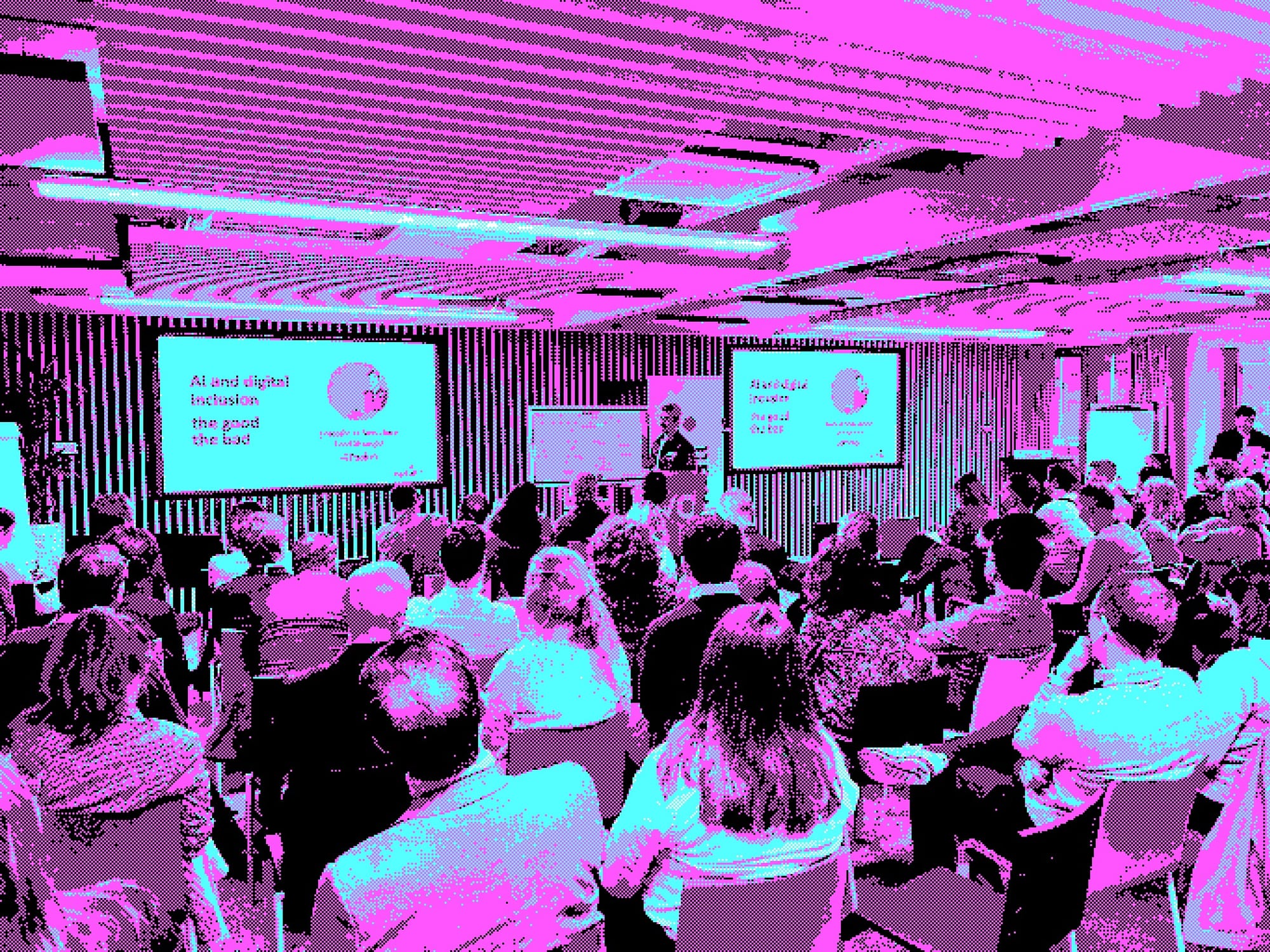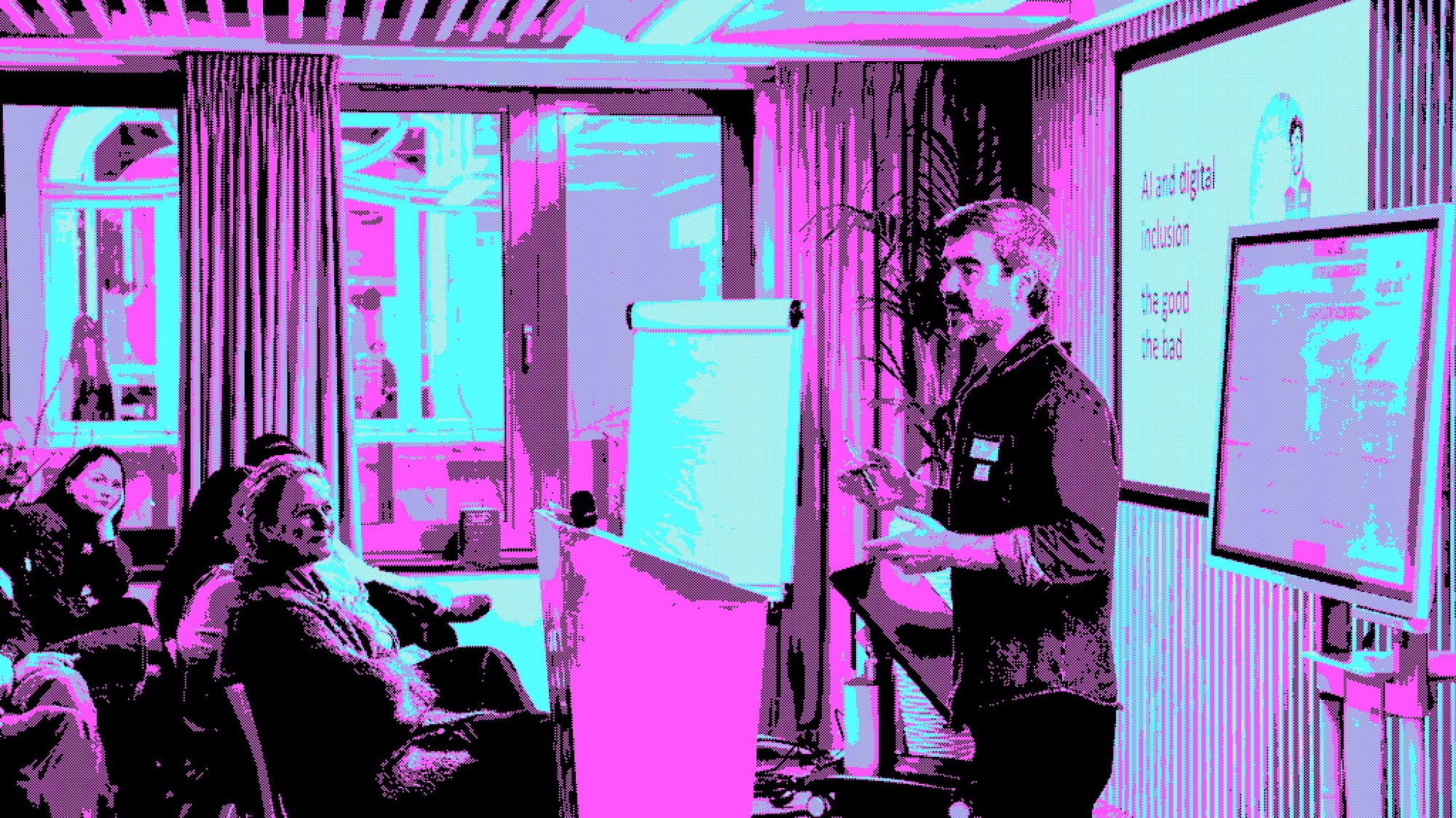AI en de digitale kloof
Als AI een gamechanger is, dan verschuift het doel.

Will AI widen the digital divide?
If AI changes the game, then it changes the goalposts too. That's a risk.
AI is taking the world by storm. It seems everyone is enamoured by ChatGPT and the like. But is everyone really? Are we not leaving many behind?
Because of my work at In The Pocket, I was fortunate to have played a very small role in what has now become DigitAll: the Belgian ecosystem for digital inclusion.
As a digital product studio, we create products that people use to pay and shop, to manage their health and their home. Unsurprisingly, accessibility has always been high on our radar.
Digital inclusion takes an even wider view. It looks at accessibility. But also at access to technology. At skill, confidence, language, and trust.
It's something we should be mindful of as a society, and as solution builders.
Given the rise of AI, I was very happy that the nice people of DigitAll invited me to their end-of-year event, to share my thoughts on the following question: is AI a good thing, or a bad thing, for digital inclusion?
I went in naked, which is to say: without any slides. Putting things on a slide gives the semblance of having answers. I don't. I have questions.
Only upon facing the crowd, did I realize people in the public and policy sector have seen their fair share of white males reading off a piece of paper. Oops.
Below is a redacted version of my speech, which is about the polar opposite of the AI hypespeak now dominating our professional diets.
Here we go.

A nice dream
Sometimes I'm told that AI 'democratizes technology'.
We have crazy information technology that's available to us all. Capable of understanding human language. Allowing us to talk to it. Put like this, AI does sound like the great equalizer.
If we believe the dream, our future with AI will be Her. All of us with our very own Sam, the smart assistant, ready to help. We just gotta ask. In our own language. It can't become any simpler.
But then some LinkedInfluencer wakes me from this dream by slapping me in the face with the latest guide on prompting. Warning me yesterday's tools are already old news. Telling me I must try these 75 new AI-tools, without which I will become redundant.
So I worry.
Digital was already moving fast. Too fast for many people in society. (The digital divide is being encountered by ±40% of Belgians.) With AI, it seems we've gone full hyperspeed.
Here's what we'll need to pay attention to.
Risky business
Access
I'm going to cut some corners here, and say that generally speaking, the playing field has been greatly leveled when it comes to access to technology. Software in the cloud, and improvements in smartphones and laptops, mean we don't all need the latest, greatest devices.
Enter companies like Apple, putting their grand AI vision behind a device upgrade. And if not a new device, then how about a subscription? AI is a very expensive hobby, so better pay up for Gemini Pro Plus Ultra or SuperClaude.
If these assistants will be as transformational as were are being told, then we’re risking a world where it’s pay to play. And pay to win. It will be survival of the techiest.
Trust
Many already don't trust technology. And with AI, we're sending a lot of mixed messages. For a long time, we were told computers are exact systems. Calculators. No need to second guess a calculator. You can believe what's on the screen.
Not so with LLMs. These are inherently guessing machines. By all means, don't believe what they say.
We have a lot of education to do here. Even people working in tech blindly trust the output of a system like ChatGPT.
So how on Earth are we going to explain that to people who are already hesitant to use technology?
- Either they will blindly trust an AI system, lacking an understanding of its limitations.
- Or it will be the final straw. The final intimidation. The final complication:
"You told me to trust the computer. And now you’re telling me not to trust the computer?"
And I'm not even talking about how much trust will get eroded by AI-powered scamming or misinformation. That's a whole different problem, one that goes beyond the digital divide.
Let's first focus on getting people to trust an AI system for what it can and cannot do.
Guidance
We'll have to guide people into a world with AI. Ease them into it. Tell them how to use it.
I'm sorry, but the chat paradigm we see today will not be the final form. It will not be the only way to engage with systems. It's simply too overwhelming. Or lazy.
Let's timetravel back to the seventies. If I were to put a beige box in front of you, with a blinking text cursor on the screen, and told you: "Here's a machine that can do anything you like." Would you know what to do? My guess is, most of us would not.
Luckily, thoughtful people added a graphical interface to that screen. They built software. They designed solutions, specifically made to assist users with certain tasks. The underlying technology was simply the means to that end. The means didn't matter.
I cannot wait for AI to be put back under the hood. "As soon as it works, we don't call it AI anymore," a smart person once said. I'm getting tired of talking about AI for AI's sake. I want to talk about designing elegant digital solutions for people, and how that will make their lives easier.
We have our work cut out for us
Should I sound like an AI boomer, forgive me: it's the antibodies kicking in after getting an overdose of AI Hypium.
I'm not blind. The technology is immensely powerful.
That's precisely why we need to do better. To channel that power for good. To avoid uneven access to it.
If AI changes the game, then the digital goalpost changes too, even farther out of reach for people across the digital divide.

Build better
Luckily, there's many people who want to take up arms.
Society-builders
To those working on policy and awareness. Keep doing what you're doing. Educate people. Make them aware of the potential, and the limitations too.
Make sure we see AI for what it is: another technology. Not magic. We shouldn’t be scared. We are not powerless, contrary to what some hype men would lead us to believe.
Let’s have the debate: what do want to use AI for? What don’t we want to use it for? We decide.
Solution-builders
To those building digital products, or companies offering digital channels. Let's build even better things.
Let's move beyond the prompt. A chatbot is not a magical solution. It's a nice way to improve search or support, sure. But it's not an excuse to ignore information architecture. To think we got a free pass on designing thoughtful user journeys.
Adapt your design principles for the age of AI. AI solutions are different. Because they are new. Because they are powerful. Because they make mistakes.
You need to:
- Explain users what to expect. What will happen, and how that works.
- Explain the limitations, and gracefully handle errors.
- Build trust.
My colleagues, like Peter, have written some excellent design principles for AI. Drop me a line if you want them.
Choices
In summary: unfortunately, I worry AI will rather widen the digital divide, than close it.
If we don't guide people who are on the fence, even technology that sounds more natural, will still be too intimidating.
And if we don't guide the technology itself, we will see even more unwanted use cases.
But we are not powerless. Yes, the genie is out of the bottle. But we grant the wishes.
AI is technology. It's not something we cannot control.
We can design the AI society we want to see.
We can design the AI solutions that work for us, not against us.
